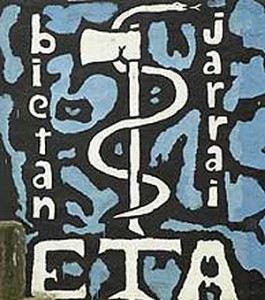
Another masked member of ETA speaking to a camera, another message to the Spanish government calling for talks and lamenting the deaths of fellow terrorists. And yet this time, it was different.
ETA’s announcement on Thursday of the abandonment of its four-decade campaign of violence has been warmly welcomed by the Socialist government, by opposition leader Mariano Rajoy and by observers and analysts who have followed the Basque situation closely.
Strangely though, the declaration sounds like only a small advance from previous announcements made by the group and which were widely dismissed as ploys or timid cop-outs. This week’s “definitive end” to the group’s “armed activity” follows last year’s ceasefire announcement and January’s “permanent, general and verifiable” ceasefire.
With such subtle differences between these statements, clearly it was more than just words at play here. Behind the scenes, ETA was made to realise that its time really was up and behind the scenes it got the message across that it understands this. ETA’s own izquierda abertzale political support clearly have played their part, so too, possibly, have international mediators such as South African lawyer Brian Currin.
Currin was present at the peace conference held in San Sebastián three days before the historic announcement, as were Kofi Annan, Bertie Ahern, Gerry Adams and other international figures. The conference caused something of a stir, with the central and Basque governments staying away and insisting that Spanish democracy, not a gathering of public figures, would finish off ETA.
Meanwhile, the Popular Party’s Esteban González Pons offered this gem on peace-brokering to Annan and co: “Foreigners who go to a peace conference in the Basque Country thinking that they are in Ireland or South Africa, frankly don’t have a damned idea about what country they are in.”
With those pithy words, González Pons personified, brilliantly but quite unwittingly, one of the main obstacles in the way of Basque peace over the years: a gauche provincialism that no statesman would be proud of. This tetchiness in the face of meddling foreigners has its extension in the anti-ETA table-thumping that many of Spain’s politicians – and magistrates – have employed throughout the Zapatero administration.
One instance of this was the trial against Basque socialist Patxi López and former regional premier Juan José Ibarretxe for meeting with Arnaldo Otegi, of the banned nationalist party Batasuna. Plenty of other examples have been on display in Congress over the last seven years, where Rajoy even accused Zapatero of “betraying the dead” with his peace efforts.
Curiously, Rajoy’s tone was altogether different in response to ETA’s latest move, an indication that he is closer to Zapatero than may be apparent on the Basque issue.
New government, a new start?
In a couple of months’ time, Rajoy will almost certainly be leading a new Spanish government. And one of his priorities will be to ensure the Basque peace process develops swiftly but fairly, as far as is possible. The clamour for retribution from Spain’s highly politicised victims’ groups will be deafening and many in his own party will probably pressure for him to always take the hard line.
The pain for those who lost loved ones at the hands of ETA’s terror will always be there. But now is a chance for something akin to a fresh start for others: those followed almost every second of their lives by bodyguards due to the ETA threat; those Basques who for a long time felt politically invisible; and for those members of ETA who now realise the senselessness of their violence.
Crucially, it’s also a chance for a fresh start for the politicians in Madrid; a chance to reject cynical electioneering, embrace statesmanship and build a lasting peace.
Cynicism on all sides. Catalan separatists of CUP and SI have immediately called for the next step to be towards the independence of the Basque Country and Catalonia. As if ETA should be congratulated both for laying down the arms, but also for having used them in the first place:
http://www.lavanguardia.com/politica/20110819/54202762127/un-dirigente-de-solidaritat-apuesta-por-la-no-disolucion-de-eta.html